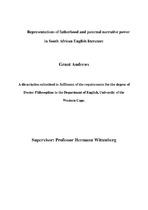Representations of fatherhood and paternal narrative power in South African English literature
Abstract
This study explores the different ways that South African novels have represented fatherhood across historical periods, from the dawn of apartheid to the post-transitional moment. It is argued that there is a link between narrative power and the father, especially in the way that the father figure is given authority and is central to dominant narratives which support pervasive ideologies. The study introduces the concept of paternal narratives, which are narratives that support the power of the father within patriarchal systems and societies, and which the father is usually given control of. This lens will be applied to prominent South African literature in English, including early texts such as Alan Paton’s Cry, the Beloved Country, Nadine Gordimer’s Burger’s Daughter and J. M. Coetzee’s In the Heart of the Country, where the father’s authority is strongly emphasised, and where resisting the paternal narratives often leads to identity struggles for sons and daughters. Later texts, published during the transition from apartheid, often deconstruct the narrative power of fathers more overtly, namely Mark Behr’s The Smell of Apples, Zakes Mda’s Ways of Dying and K. Sello Duiker’s The Quiet Violence of Dreams. More recent novels, published in “post-transitional” South Africa, are radical in their approach to father figures: fathers are often shown to be spectral and dying, and their control of narratives is almost completely lost, such as in Lisa Fugard’s Skinner’s Drift, Mark Behr’s Kings of the Water, Zoë Wicomb’s Playing in the Light and Zukiswa Wanner’s Men of the South. Exploring these shifting representations is a useful way to unearth how ideological and social shifts in South Africa affect the types of representations produced, and how fatherhoods are being reimagined.

